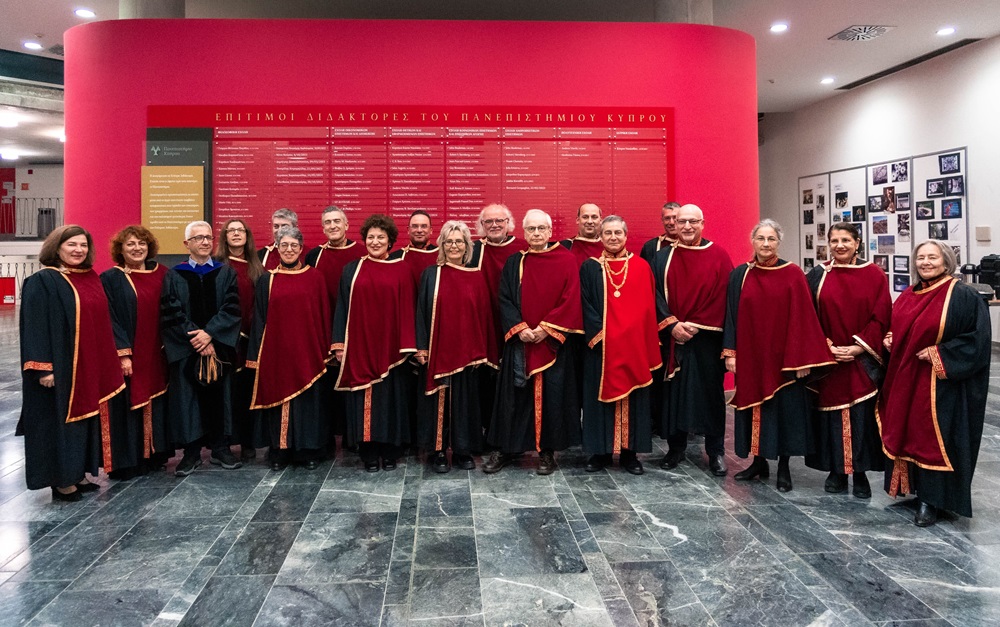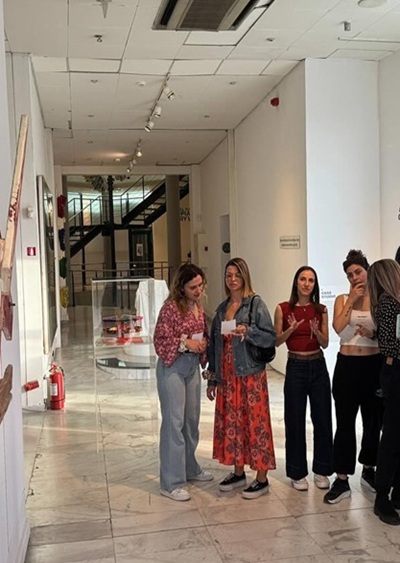
In a special ceremony and in the presence of numerous personalities, the University of Cyprus honoured Nasos Vagenas, one of the leading poets, philologists and literary critics of our time. At an event held on 17 February 2025, Mr. Vagenas was awarded an Honorary Doctorate of the Faculty of Philosophy of the University, in recognition of his valuable contribution to modern Greek literature.
The Faculty of Philosophy, the Senate and the Council of the University of Cyprus unanimously decided to honour the Professor Emeritus of the University of Athens for his work. As noted in the Resolution of the Annointment, which was read by the Dean of the Faculty of Philosophy, Associate Professor Petros Papapolyviou, he has captured with authoritative and robust discourse the fields of knowledge, works and personalities of modern Greek literature and contemporary intellectual life.
The Rector of the University of Cyprus, Professor Tasos Christofides, declared the opening and closing of the meeting, while Professor Alexandra Samouil from the Department of Byzantine and Modern Greek Studies spoke about the work and personality of the honoured. In her speech, she described him as a great and multifaceted personality of Greek letters, referring to the numerous Greek and international distinctions he has received, including the Golden Cross of the Order of the Hellenic Republic (2021). She also pointed out that his poetic work has been translated into ten languages, while eight magazines have dedicated special issues to his poetry. He attached particular importance to the way in which Mr Vagenas defines himself as a “philologist”, explaining that for him, philology is not just a science, but a set of skills ranging from the critical editing and interpretation of a text to its evaluation.
In his response, Nasos Vagenas thanked the University of Cyprus for this great honour, stating that he feels deeply connected to Cyprus and its culture. In his speech, entitled “The meaning of a Cypriot experience”, he spoke about his relationship with Cyprus, which began in his student days and was strengthened through his university and literary work. He referred to Cypriot writers such as Kyriakos Charalambides, Michalis Pasiardis and Vasos Ftochopoulos, as well as his participation in committees of Cyprus’ state literary awards and in the magazine “Akti”, where he was a member of the editorial committee for ten years.
He also stressed that the Cypriot dialect is “more Greek than Greek”, highlighting its importance in literature. Referring to the University of Cyprus, he said that he felt a special connection, as during the academic year 1995-1996 he taught as a visiting professor in the Department of Byzantine and Modern Greek Studies. He made special reference to the poet George Seferis and his relationship with Cyprus, stating that it was thanks to the late Savvas Pavlou that he came to know both Seferis and Cyprus itself more deeply. In a particularly moving moment, Vagenas referred to the meaning of his work, saying: “it is great luck that what you love is identical to your profession”, explaining that he never treated literature and poetry as a means of making a living, but as a deep inner need. In closing his speech, he answered in a symbolic way to the question “how much is the surface of Cyprus”, saying that it is constantly increasing. “And when you reach the scale of the individual, you realize that its surface tends towards infinity. This infinity that Solomos’ gaze was looking at, climbing up the mast of the occupation flag.”
The ceremony was attended by, among others, the Deputy Minister of Culture, Mrs.Lina Kassianidou, the Deputy Government Spokesman, Mr.Yiannis Antoniou, the Emeritus Professor of the University of Cyprus and President of THOC, Mr.Pantelis Voutouris, members of the Senate, numerous academics, students and appreciators of Mr.Vagenas’ work. They all expressed their appreciation and admiration for his great contribution to modern Greek literature and literary criticism.







Leave A Comment